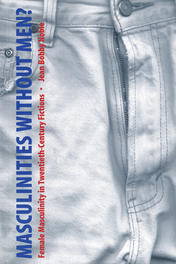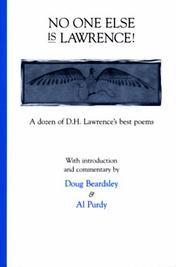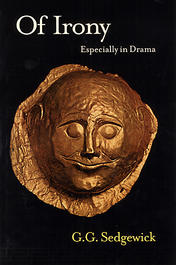Literary Criticism

Masculinities without Men?


The Man of Tyre
by D.H. Lawrence
The man of Tyre went down to the sea
pondering, for he was Greek, that God is one and all alone and ever more shall be so.
And a woman who had been washing clothes in the pool of rock
where a stream came down to the gravel of the sea and sank in
who had spread white washing on the gravel banked above the bay,
who had lain her shift on the shore, on the shingle slope,
who had waded to the pale green sea of evening, out to a shoal,
pouring sea-water over herself
now turned, and came slowly back, with her back to the evening sky.
Oh lovely, lovely with the dark hair piled up, as she went deeper, deeper down the channel, then rose shallower, shallower,
with the full thighs slowly lifting of the water wading shorewards
and the shoulders pallid with light from the silent sky behind
both breasts dim and mysterious, with the glamourous kindness of twilight between them
and the dim blotch of black maidenhair like an indicator,
giving a message to the man --
So in the cane-brake he clasped his hands in delight
that could only be god- given, and murmured:
Lo! God is one god! But here in the twilight
godly and lovely comes Aphrodite out of the sea
towards me!
Commentary The Man of Tyre
B. This seems paired with "Invocation to the Moon". They're both invocations to the feminine but here the invocation works brilliantly.
P. "Invocation" . . . is a little verbose and, as I pointed out, exaggerated. "The Man of Tyre" seems right, the phraseology. That seems to be all that needs to be said.
B. This is a glorious celebration of womanhood.
P. And religion. Because it's a religious poem, it makes the feeling itself religious.
B. That's a beautiful way of putting it. The celebration of the woman becomes religious.
P. He brings in religion, femininity, beauty, and sex. The whole works.
B. It's all one for Lawrence. The language, oh, the language in the third stanza is magnificent; in her, in her elemental femininity, giving a message to the man. It's a glorious painting of Frieda, no?
P. I think "Giving a message to the man" is amusing.
B. Well, Al, Frieda was probably the only woman for Lawrence. The language in that third stanza is not so surprising but it all comes together brilliantly.
P. The words themselves, even in the thoughts, the phraseology is not so startling, as you say, but ...
B. Often, in Lawrence, it's the cumulative effect, the incantatory build-up of line upon line.
P. He does something similar in "Bells," which we talk about next.
B. You see this more and more in the longer poems. Ginsberg attempted this.
P. Yes, but he piled lines upon lines to such a degree that they toppled over.
B. The technique can easily break the poem apart. But the poems we've chosen don't topple over.
P. Maybe the Americans worship Whitman so much that when they saw that Ginsberg was influenced by Whitman they liked him for that. And of course it was also what Ginsberg said. Sometimes Americans like to hear bad things about themselves. They're most interested in other people's opinions about them, so long as they can forgive the bad opinions.
B. Lawrence could have gone on and on in the third stanza but he uncharacteristically contains himself in the formal shape of the poem. "The Man of Tyre" is held beautifully. It's held within the poem, in a way that is spoken about in the last stanza.
P. There is some exaggeration but it's exaggeration that you can live with. I almost recall the first time I read this poem years ago and thought "what a lovely poem," and you read it many more times and in a commonplace voice because somehow Lawrence makes it commonplace and wonderful at the same time.
B. Your reading in that commonplace voice is so good for the poem because that's what the language calls for, you get rid of that jarring and rhyme of the "sea . . . me" so close together at the end. Read your way one is not disturbed by the ending.
P. I didn't even notice it. Also it's a little story. It's a story . . .
B. Meaning ...
P. Well, let's go through it. Incidentally, do all Greeks "ponder"? It makes you wonder. Anyway, it's giving him credit for being a philosopher.
B. In Greek mythology they do.
P. And philosophy too.
B. A minor cavil. I wish to hell we could get rid of Lawrence's extreme overuse of the exclamation point! But they don't bother you, eh?
P. I don't even think of them. Why do they bother you?
B. They suggest a weakness of expression, a weakness in the language which the punctuation is attempting to alleviate. if he had the language that he really wanted, the exclamation marks would be unnecessary. Maybe he doesn't have the language he wants, maybe it's not possible for words to convey what Lawrence often feels.
P. I read the poems for the sense of them, I pay no attention, unless it's a line break.
B. I guess I feel the language is good enough, and therefore it doesn't need them. He used them a lot and I don't think they're necessary.
P. No, I don't either. Sometimes Lawrence's whole language is exclamation.
B. Right. You don't need the marks. However, it's a minor cavil.
P. You like the word "cavil."
B. I seem to have just discovered it. It's just that these poems are so great, it's sometimes necessary to make some minor criticism, just to keep sane. And they could be better. But I don't mean to nitpick. "The Man of Tyre" is a great homage to the feminine.
P. Yes, though strongly religious because it makes female-male relations religious.
B. For Lawrence they were.






